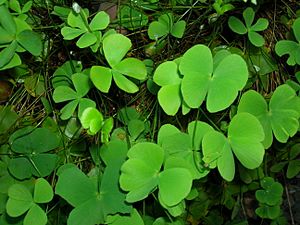Villous waterclover facts for kids
Quick facts for kids Villous waterclover |
|
|---|---|
 |
|
| Conservation status | |
| Scientific classification | |
| Genus: |
Marsilea
|
| Species: |
villosa
|
Marsilea villosa, also known as the villous waterclover (in English) or ʻihiʻihi (in Hawaiian), is a special type of fern. It grows only on the Hawaiian islands of Oʻahu, Molokaʻi, and Niʻihau. This means it is endemic to these islands, found nowhere else in the world!
Like other plants in its family, the leaves of M. villosa look a lot like a four-leaf clover.
Where the Villous Waterclover Lives
This unique fern lives in special places that get flooded from time to time. These areas become temporary pools of water, often found in dry forests and shrublands at lower elevations. These temporary pools are called ephemeral pools. The fern needs these pools to grow and make new plants.
How the Villous Waterclover Reproduces
The Marsilea villosa fern has a special way to make new plants. It uses a part called a sporocarp. When there is standing water, the sporocarp opens up. This releases tiny spores.
The spores then release sperm. This sperm needs water to swim. It swims towards and fertilizes the female parts of the plant, called ova. This process is called fertilization.
For new fern plants to start growing, the water in the pools must dry up. The sporocarps, which hold the spores, only form once the soil has become dry enough. This amazing cycle shows how the fern depends on both water and dry land to survive.
Protecting This Special Plant
Sadly, there are not many Marsilea villosa plants left. Fewer than 2,000 individual plants exist today. They are found in only four remaining groups. Because of this, the United States government officially listed the plant as an endangered species in 1992. This means it is protected by law to help it survive.


